In 1921, Roscoe "Fatty" Arbuckle was accused of raping and killing silent film actress Virginia Rappe — and though he was eventually acquitted, his name would forever be linked to her mysterious death.
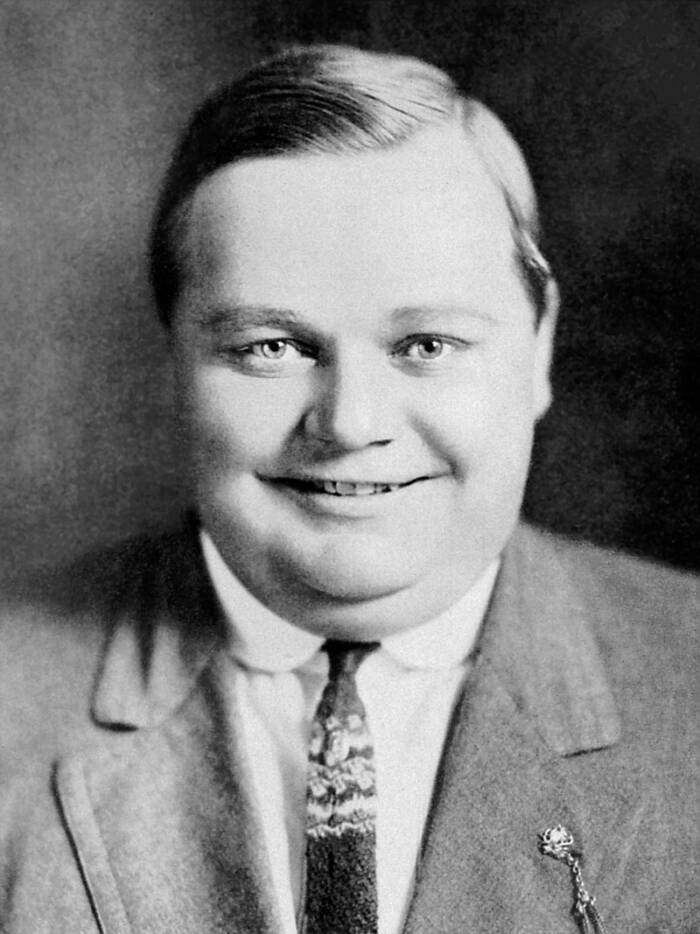
Public DomainActor Roscoe “Fatty” Arbuckle, pictured in 1916.
Roscoe “Fatty” Arbuckle’s story is forever tied with one of Hollywood’s earliest scandals: the sudden demise of Virginia Rappe.
Arbuckle had risen to fame in the early 1900s, eventually becoming one of the highest-paid silent film actors in Hollywood through his work with Paramount Pictures. His unique style and physical comedy appealed to audiences across America, earning him a significant following.
However, Fatty Arbuckle’s career took an unexpected turn in 1921 when he was involved in a scandal surrounding the mysterious death of silent film actress Virginia Rappe. She had perished just days after a hotel party in San Francisco, which she and Arbuckle had both attended. And before long, a fellow partygoer had accused Arbuckle of raping and murdering Rappe.
Arbuckle faced manslaughter charges, which were contested in three highly publicized trials. Despite his ultimate acquittal, many film studios had already distanced themselves from him due to the negative publicity. His career never fully recovered — and even though he eventually received a promising opportunity, he suffered a heart attack and died the same day.
The Early Life Of Roscoe “Fatty” Arbuckle
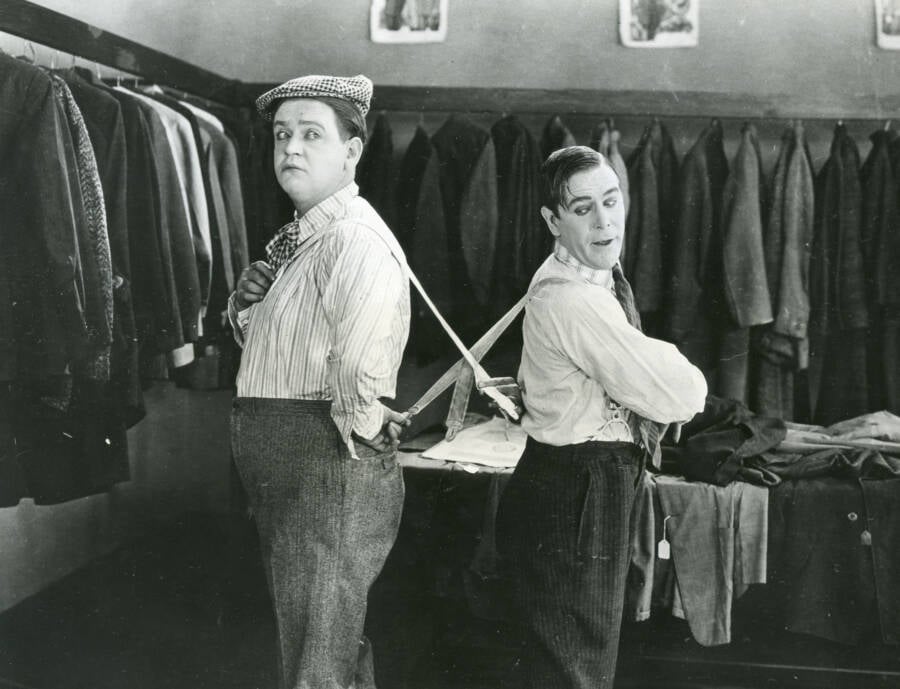
Pictorial Press Ltd/Alamy Stock PhotoFatty Arbuckle (left) came from humble means, but showed promise as an entertainer early on.
Roscoe Conkling “Fatty” Arbuckle was born on March 24, 1887, in Smith Center, Kansas to his parents Mary Gordon Arbuckle and William Goodrich Arbuckle. His name, inspired by Republican congressman Roscoe Conkling, was a representation of William Arbuckle’s disdain for his son.
William Arbuckle, a Democrat, named his son after a politician he despised after seeing how large of a baby he was — Roscoe Arbuckle weighed over 13 pounds at birth. Since William and Mary Arbuckle were both slim, William was convinced that his son was a product of infidelity.
The family, including eight of Roscoe Arbuckle’s siblings, first lived on a farm in Smith Center. William Arbuckle often spent time away from the home, leaving Mary Arbuckle to take care of the family on her own.
When Roscoe Arbuckle was a year old, his father moved the family to Santa Ana, California to run a hotel. It was there where the future movie star eventually discovered his love for performing. His mother encouraged him to perform, praising his beautiful tenor voice, and he first sang onstage with Webster-Brown stock company when he was just eight years old.
Roscoe’s father, on the other hand, still loathed him. William frequently beat Roscoe, sometimes even smashing his head into a tree. These incidents were made worse with every passing year as his mother’s health declined (possibly from the effects of giving birth to such a large baby).
When Roscoe Arbuckle was 12, his mother tragically died, and his father took that opportunity to throw him to the wolves. Almost overnight, William Arbuckle left the hotel in Santa Ana and disappeared with one of Roscoe’s older siblings. With nowhere left to go, Roscoe Arbuckle pleaded with the new managers at the hotel to let him stay. Sympathetic to his plight, they provided him with a tiny closet for a room and made sure he was fed.
Roscoe soon began doing odd jobs around the hotel in exchange for the managers housing him there. While working, he would sing to himself, eventually attracting the attention of hotel musician Pansy Jones. Impressed, Jones encouraged Roscoe to perform in an upcoming local talent show. Though Roscoe initially struggled during a sing-and-dance number, he won the crowd over by somersaulting — right into the orchestra pit. He received wild applause and laughter, inspiring him to continue as an entertainer.
How Fatty Arbuckle Made It Big In Hollywood’s Comedy Scene
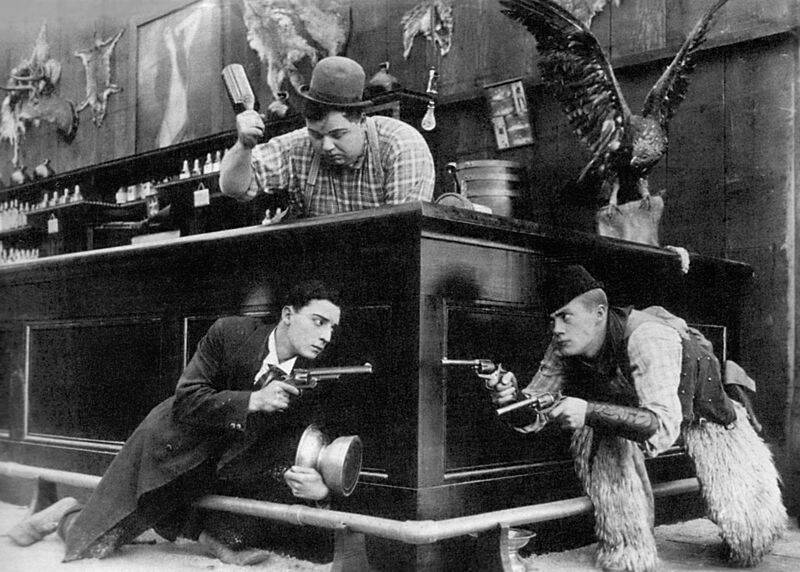
Paramount Pictures/Wikimedia CommonsFatty Arbuckle (center) in the 1918 silent film Out West.
Starting in 1904, Roscoe Arbuckle worked with various theaters and traveling performing groups, eventually visiting places like Japan and China.
In 1909, Arbuckle appeared in his first film, Ben’s Kid. From there, he started to make a big impression in the comedy world, especially after he appeared in the hit sketch Keystone Cops, starting in 1913. Weighing between 250 and 300 pounds for much of his life, he was sometimes seen as the butt of the joke, but he also impressed many viewers with his agility and athleticism.
He begrudgingly went by his childhood nickname “Fatty” since it helped draw attention to his performances and gained him countless new fans, but he purportedly hated it whenever anyone called him by that name offscreen.
Fatty Arbuckle’s performances eventually became so popular that Paramount Pictures offered him $1,000 a day plus 25 percent of each film’s royalties in 1914. By 1917, Arbuckle and studio executive Joseph M. Schenck had created their own film company, Comique, which only propelled Arbuckle further into the public eye. Notably, his company attracted numerous other talented entertainers like Buster Keaton.
Arbuckle’s success with Comique led to yet another deal with Paramount Pictures in 1918. This time, they offered the actor a whopping $3 million to make 18 motion pictures in the next three years.
But just a few years later, tragedy struck — and Fatty Arbuckle’s sparkling career suddenly disappeared in front of his eyes.
Inside Virginia Rappe’s Mysterious Death — And The Allegations Against Fatty Arbuckle
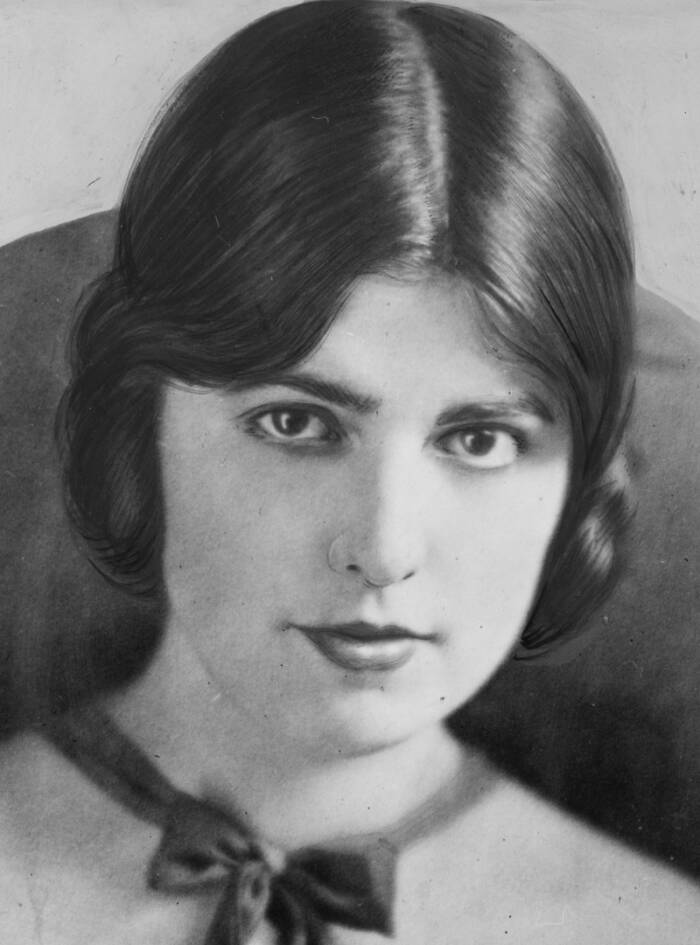
Library of Congress/Wikimedia Commons
Silent film actress Virginia Rappe.
On September 5, 1921, Fatty Arbuckle and a silent film actress named Virginia Rappe attended the same Labor Day weekend party at the St. Francis Hotel in San Francisco (Arbuckle may have been the one who planned the party).
When 30-year-old Rappe arrived at the hotel, she soon began partying with 34-year-old Arbuckle and his friends. Despite Prohibition, alcohol was widely served and enjoyed among many of the party guests.
At some point during the party, Rappe was found “writhing in pain” in a hotel room — where she and Arbuckle had briefly been alone together. A doctor was called and determined that Rappe was heavily intoxicated.
But Rappe’s health continued to rapidly decline, and even though she was eventually taken to the hospital, she tragically died on September 9, 1921. Her cause of death was determined to be peritonitis (a type of inflammation), resulting from a ruptured bladder.
At the hospital, another woman who attended the Labor Day party, Maude Delmont, told doctors that Fatty Arbuckle had raped Rappe.
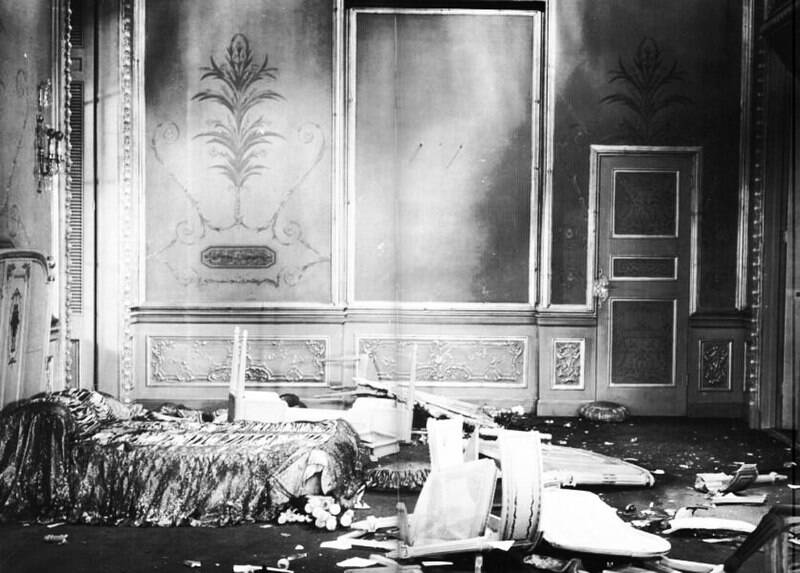
Public DomainA room at the St. Francis Hotel that was occupied by Fatty Arbuckle and other guests during the infamous party.
Though Virginia Rappe’s autopsy would later conclude that there “were no marks of violence on the body, no signs that the girl had been attacked in any way,” Delmont’s shocking allegation had quickly made its way to the police, and Fatty Arbuckle was arrested on September 10th.
Authorities suspected that Arbuckle had forced himself on Rappe, and his large stature had possibly fatally injured her. Despite Arbuckle’s pleas of innocence, he was charged with murder (later reduced to manslaughter).
While Arbuckle’s story about his encounter with Rappe changed during the investigation (he originally denied being alone with her, but then later said he was briefly alone with her), Delmont also changed her story. Disturbingly, she was also found to have a history of blackmailing male celebrities. Delmont was even caught sending telegrams to attorneys: “WE HAVE ROSCOE ARBUCKLE IN A HOLE HERE CHANCE TO MAKE SOME MONEY OUT OF HIM.”
At his first trial, Arbuckle fought back against prosecutors by giving his side of the story: He had discovered Rappe in pain and vomiting in a hotel room bathroom, carried her to a bed, and then tried to get her help.
That trial was deemed a mistrial.
A second trial also resulted in a mistrial. Finally, in March 1922, a third trial began, and by April, Arbuckle had been acquitted. The jury even formally apologized to Arbuckle for his ordeal, believing that Rappe’s death was a tragic accident in which Arbuckle played no part.
Strangely, Virginia Rappe’s death has never been fully explained. Though there wasn’t any proof she’d been attacked, medical experts have said that spontaneous ruptures of the bladder are very rare. Some who knew her claimed that she had a pre-existing bladder condition that worsened whenever she drank alcohol, so it’s possible that may have led to her demise. In any case, Fatty Arbuckle’s name was forever tied to the tragedy.
What Happened After The Scandal Passed?
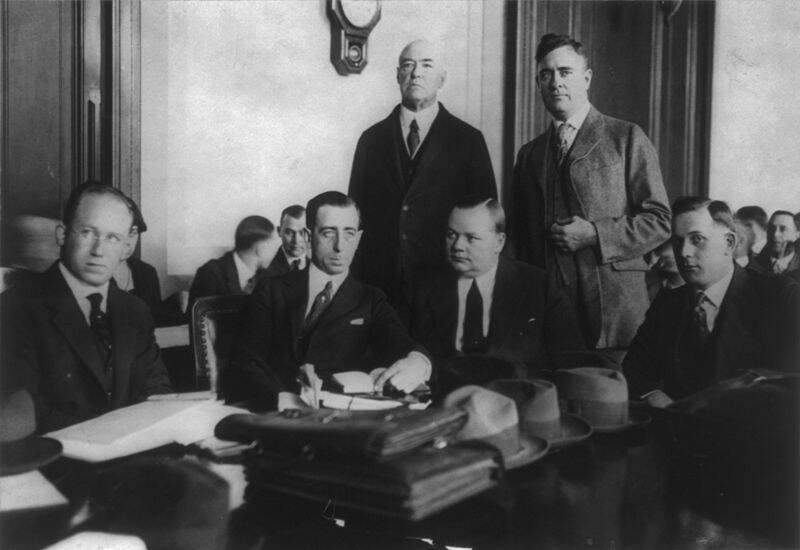
Public DomainFatty Arbuckle at his first trial in 1921.
Following Fatty Arbuckle’s acquittal, the star hoped to return to his career as a Hollywood actor, but found doors closed in his face everywhere he turned.
Arbuckle’s name had been dragged through the mud in the press before and during the trials, with papers claiming Arbuckle had crushed Rappe with his large frame and committed horrific sexual depravities. (The deceased Rappe’s reputation also suffered, as rumors spread that she was a hysterical, promiscuous drunk who had multiple illegal abortions.)
Due to the controversy, Arbuckle’s new movies had been pulled from the theaters. And even after he was acquitted, the Motion Pictures Producers and Distributors of America issued a ban on Arbuckle from working in the film industry, claiming he was an example of Hollywood’s “debauchery.” Though the ban didn’t last long, the damage had already been done.
With his passion out of his grasp, Arbuckle became depressed and reclusive. He and his wife, Minta Durfee, even divorced in 1925.
Though Arbuckle eventually returned to Hollywood, he first had to work as a director under a pseudonym, and so he used the name William Goodrich. Ironically, this was his abusive father’s first and middle name.
He later got remarried twice, first to Doris Deane and then to Addie McPhail.
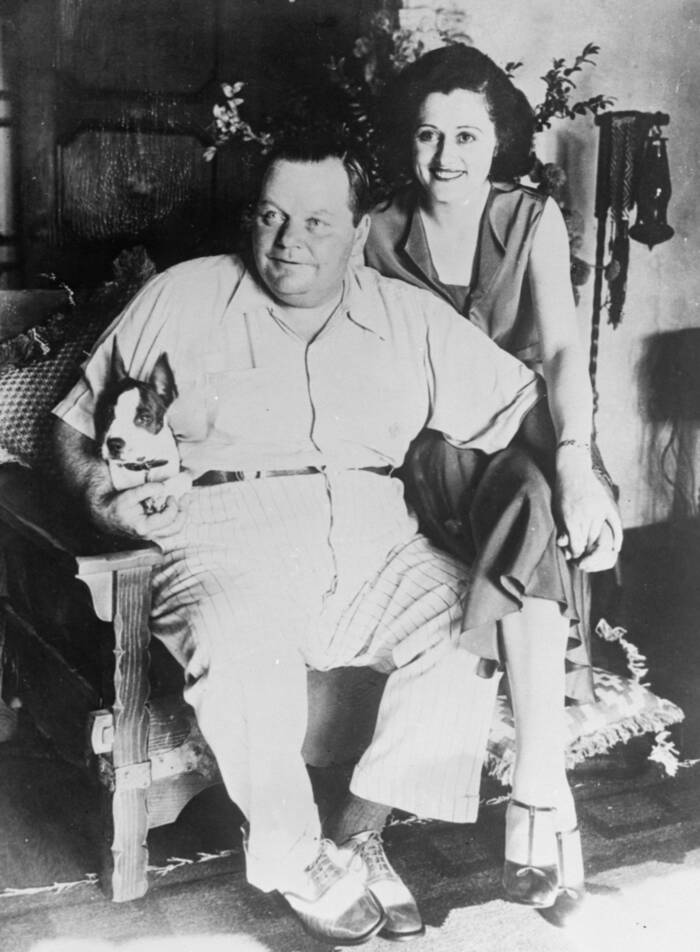
Smith Archive/Alamy Stock PhotoFatty Arbuckle with his third wife Addie McPhail.
Surprisingly, in 1932, Arbuckle seemed to be poised for a true comeback as an entertainer. He was able to appear in some Warner Bros. comedy shorts under his own name, which ended up being successful. By the next year, Warner Bros. had offered Arbuckle a lucrative feature film contract.
Fatty Arbuckle was ecstatic, convinced his life was back on track. According to the BBC, he told his friends and family members how happy he was, saying, “This is the best day of my life,” when he signed the contract.
That same day, Arbuckle suffered a heart attack and died at age 46.
In the end, Roscoe “Fatty” Arbuckle’s life remains a story of shocking highs and lows. From a beloved figure in Hollywood to a man haunted by scandal, Arbuckle’s journey reminds us of how quickly fortunes can fade.
After reading about Fatty Arbuckle, learn about Clara Bow, the original flapper. Then, dive into nine infamous scandals of Old Hollywood.





